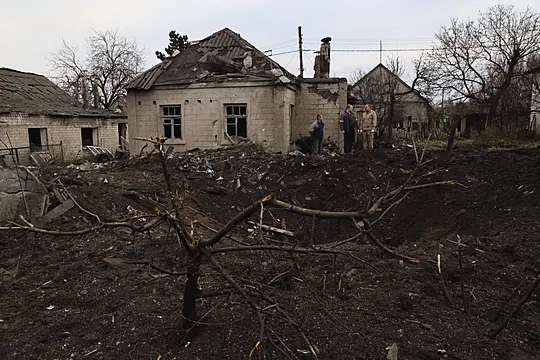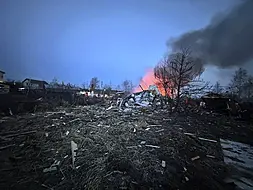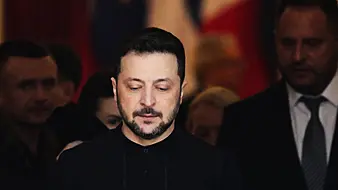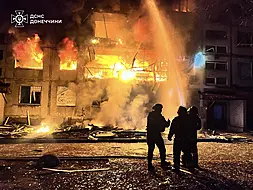Weekend shelling by Russian forces killed at least seven civilians, Ukrainian officials reported on Sunday as Pope Francis and Archbishop of Canterbury Justin Welby used their traditional Easter messages to highlight the war in Ukraine and other conflicts around the world.
While Russia continued to concentrate on seizing all of Ukraine’s industrial east, two other provinces – Kharkiv in the north east and Zaporizhzhia in the south east – came under missile, rocket and artillery fire, the Ukrainian military reported.
The governor of the Kherson region, Oleksandr Prokudin, said two communities there were hit by bombs from warplanes late on Sunday, but he did not immediately report any casualties.
Kharkiv governor Oleh Syniehubov said two men died on Sunday in shelling in Kupiansk, a city that Russia held before Ukrainian forces regained control of almost all of the province.
The city remained under attack later on Sunday as Russian forces targeted residential areas with multiple rocket launchers, Mr Syniehubov said.
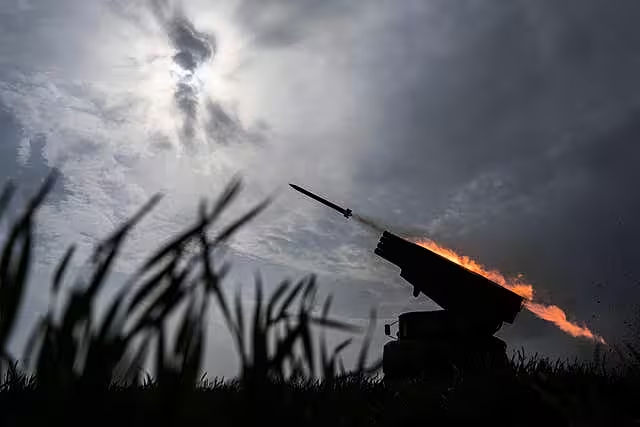
Elsewhere in the province, a 30-year-old man was admitted to hospital in a serious condition after Russian shelling of the city of Chuhuiv, he said on Telegram.
Shelling also killed two people overnight, one of them a child born in 2012, in the city of Zaporizhzhia, the capital of that province, according to city council secretary Anatoliy Kurtev.
The Zaporizhzhia region’s governor, Yurii Malashko, said 18 communities in all were shelled.
Three people were killed and five were wounded on Saturday, Mr Malashko said.
Zaporizhzhia is home to Europe’s largest nuclear power plant and one of four Ukrainian provinces that Russian President Vladimir Putin illegally annexed in September.
Since then, Russia’s military has sought to oust Ukraine’s troops from those areas, especially Luhansk and Donetsk provinces, which make up the industrial region known as the Donbas.
Bakhmut, a city in Donetsk, has seen the 13-month war’s longest battle.
Western analysts have said Russian forces recently made it into the centre of the city.

Seizing Bakhmut after more than eight months would give the Kremlin a badly wanted victory and a path to push on towards bigger Ukrainian-held cities.
The Russian army is moving elite units to Bakhmut, Colonel Serhiy Cherevaty, a spokesperson for Ukraine’s Eastern Group of Forces, said on Sunday.
Col Cherevaty said the Wagner Group, a private Russian military company whose fighters have spearheaded the offensive on Bakhmut, was incurring heavy losses, making it necessary to move in regular army units from the regular army, including paratroopers and motorised riflemen.
The vast majority of Ukrainians with a religious affiliation identify as Orthodox Christian, a faith that observes Easter on April 16 this year.
Some Catholics celebrated Easter on Sunday, while Orthodox churches marked Palm Sunday this weekend.
While delivering his Easter address from the central balcony of the Vatican’s St Peter’s Basilica, Pope Francis implored God to “help the beloved Ukrainian people on their journey towards peace, and shed the light of Easter upon the people of Russia”.

“Comfort the wounded and all those who have lost loved ones because of the war, and grant that prisoners may return safe and sound to their families,” Francis said.
Easter affirms the Christian belief that Jesus rose from the dead days after his crucifixion.
Mr Welby, who as Archbishop of Canterbury is the ceremonial head of the worldwide Anglican Communion, said the occasion provided hope that “true peace is no aimless daydream, but a reality offered because Christ was raised from the dead”.
“Injustice and brutality may seem to triumph in our short lives on earth, cruel and oppressive rulers might look as though they only get stronger,” he said during a sermon delivered in Canterbury, England.
“Yet they will vanish. The power of the resurrection is infinitely greater than they are.”
Between Saturday and Sunday mornings, Russian forces launched 40 air strikes, four missile strikes and 58 attacks from multiple-rocket launchers on various parts of Ukraine, the General Staff of the Ukrainian armed forces reported.

According to the General Staff, Russia focused attacks on the Donetsk province communities of Lyman, Bakhmut, Avdiivka and Marinka.
Donetsk regional governor Pavlo Kyrylenko said on Sunday morning that two civilians were wounded on Saturday.
Officials in Kherson province, where Ukrainian forces forced a partial Russian retreat in November, said the southern region also received numerous attacks.
They did not report any casualties.
The Institute for the Study of War, a Washington-based think tank, said late on Saturday that it thinks Russia’s overall offensive “is approaching culmination”.
The institute cited Ivan Tymochko, the head of the Ukrainian Council of Reservists for the country’s ground forces, as reporting that recent Russian attacks appeared designed to distract and disperse Ukrainian troops preparing for a potential counter-offensive.
“Tymochko stated that Russian forces are not making serious advances anywhere on the front line,” the think tank said.
Noting that Russia has made heavy use of artillery to “offset key shortcomings in combat capability”, the institute said reported ammunition shortages would “undermine the Russian military’s ability to continue offsetting its other weaknesses and limitations”.
